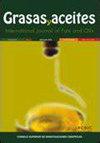摩洛哥无花果籽油储存过程中的脂质特征、挥发性化合物和氧化稳定性
IF 1.1
4区 农林科学
Q4 CHEMISTRY, APPLIED
引用次数: 1
摘要
对摩洛哥冷榨仙人掌籽油的脂肪酸、甾醇、生育酚和挥发性成分进行了研究。脂肪酸、生育酚和甾醇的含量分别为亚油酸(60.6%)、γ-生育酚(533 mg/kg)和β-谷甾醇(6075 mg/kg)。在本研究中,鉴定了23种挥发性化合物,其中14种化合物具有可感知的气味属性。在50℃条件下,对仙人掌籽油的氧化品质进行了4周的监测。PV、K232和FFA均在诱导前两周升高,诱导时间缩短;而K270值没有变化。总酚含量呈上升趋势,贮藏结束后达到0.3 mg/kg;而生育酚在第一周后开始减少。无脂渣提取物对亚油酸的氧化有很强的抑制作用。因此,在β-胡萝卜素-亚油酸试验中,与对照相比,提取物对β-胡萝卜素的漂白效果显著提高。本文章由计算机程序翻译,如有差异,请以英文原文为准。
Lipid profile, volatile compounds and oxidative stability during the storage of Moroccan Opuntia ficus-indica seed oil
The fatty acids, sterol, tocopherol and volatile compositions of Moroccan cold-pressed cactus (Opuntia ficus-indica) seed oil were studied. The most abundant fatty acid, tocopherol and sterol were linoleic acid (60.6%), γ-tocopherol (533 mg/kg) and β-sitosterol (6075 mg/kg), respectively. In this study, 23 volatile compounds were identified with perceivable odor attributes for 14 compounds. The oxidative quality of cactus seed oil was monitored over 4 weeks at 50 °C. Increases in PV, K232 and FFA were detected during the first two weeks as well as a decrease in the induction time; whereas no change was reported for the K270 values. The amount of total phenolic content increased until it reached 0.3 mg/kg and then decreased by the end of the storage period; while tocopherols started to decrease after the first week. The fat-free residue extracts showed a very strong effect to reduce the oxidation of linoleic acid. Consequently, the extracts were significantly more effective to bleach β-carotene in the β-carotene-linoleic acid assay in comparison with the control.
求助全文
通过发布文献求助,成功后即可免费获取论文全文。
去求助
来源期刊

Grasas y Aceites
工程技术-食品科技
CiteScore
2.50
自引率
0.00%
发文量
50
审稿时长
3 months
期刊介绍:
Grasas y Aceites is a peer-reviewed journal devoted to the publication of original articles concerning the broad field of lipids, especially edible fats and oils from different origins, including non acyl lipids from microbial origin relevant to the food industry. It publishes full research articles, research notes, reviews as well as information on references, patents, and books.
Grasas y Aceites publishes original articles on basic or practical research, as well as review articles on lipid related topics in food science and technology, biology, (bio)chemistry, medical science, nutrition, (bio)technology, processing and engineering. Topics at the interface of basic research and applications are encouraged. Manuscripts related to by-products from the oil industry and the handling and treatment of the wastewaters are also welcomed.
Topics of special interest to Grasas y Aceites are:
-Lipid analysis, including sensory analysis
-Oleochemistry, including lipase modified lipids
-Biochemistry and molecular biology of lipids, including genetically modified oil crops and micro-organisms
-Lipids in health and disease, including functional foods and clinical studies
-Technical aspects of oil extraction and refining
-Processing and storage of oleaginous fruit, especially olive pickling
-Agricultural practices in oil crops, when affecting oil yield or quality
 求助内容:
求助内容: 应助结果提醒方式:
应助结果提醒方式:


